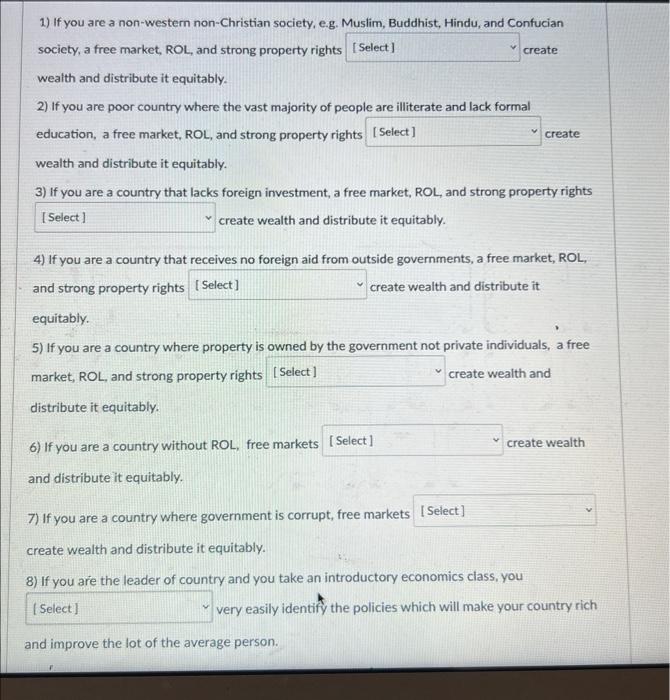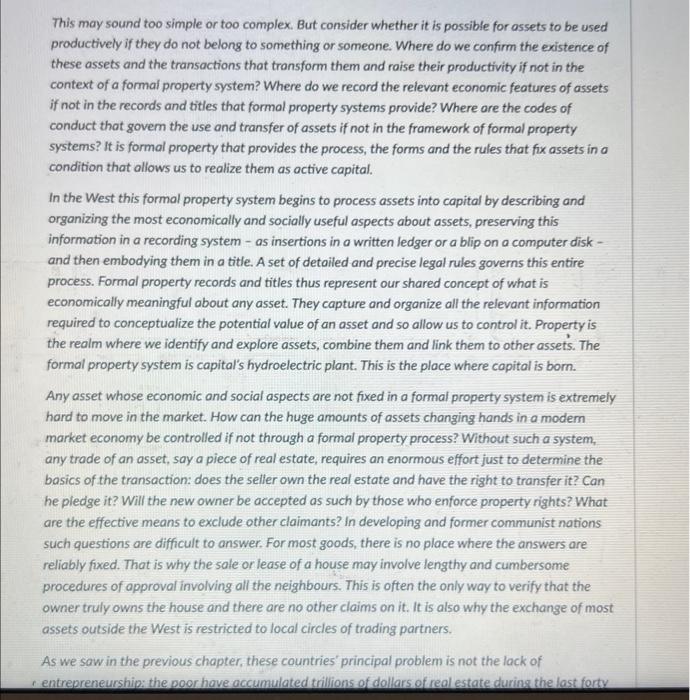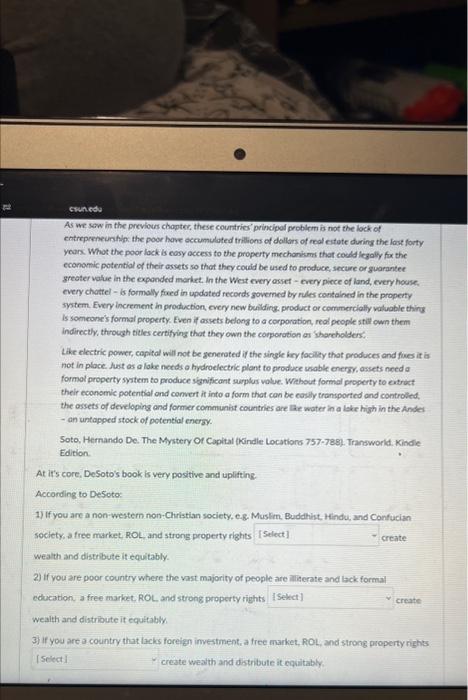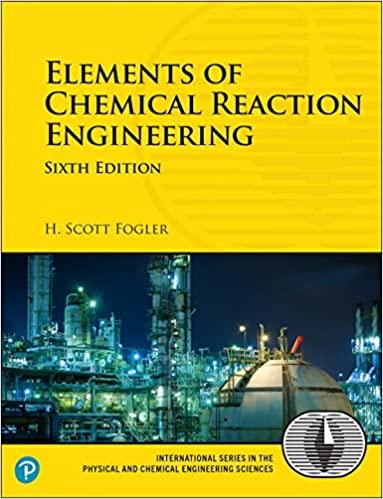
all answer options are either "can" or "cannot" thank you!
This may sound too simple or too complex. But consider whether it is possible for assets to be used productively if they do not belong to something or someone. Where do we confirm the existence of these assets and the transactions that tronsform them and roise their productivity if not in the context of a formai property system? Where do we record the relevant economic features of assets if not in the records and titles that formal property systems provide? Where are the codes of conduct that govem the use and transfer of assets if not in the framework of formal property systems? It is formal property that provides the process, the forms and the rules that fix assets in a condition that allows us to realize them as active capital. In the West this formal property system begins to process assets into capital by describing and organizing the most economically and socially useful aspects about assets, preserving this information in a recording system - as insertions in a written ledger or a blip on a computer disk and then embodying them in a title. A set of detoiled and precise legal rules governs this entire process. Formal property records and titles thus represent our shared concept of what is economically meaningful about any asset. They capture and organize all the relevant information required to conceptualize the potential value of an asset and so allow us to control it. Property is the realm where we identify and explore assets, combine them and link them to other assets. The formal property system is capital's hydroelectric plant. This is the place where capital is born. Any asset whose economic and social aspects are not fixed in a formal property system is extremely hard to move in the market. How can the huge amounts of assets changing hands in a modem market economy be controlled if not through a formal property process? Without such a system, any trade of an asset, say a piece of real estate, requires an enormous effort just to determine the basics of the transaction: does the seller own the real estate and have the right to transfer it? Can he pledge it? Will the new owner be accepted as such by those who enforce property rights? What are the effective means to exclude other claimants? In developing and former communist nations such questions are difficult to answer. For most goods, there is no place where the answers are reliably fixed. That is why the sale or lease of a house may involve lengthy and cumbersome procedures of approval involving all the neighbours. This is often the only way to verify that the owner truly owns the house and there are no other claims on it. It is also why the exchange of most assets outside the West is restricted to local circles of trading partners. As we saw in the previous chapter, these countries' principal problem is not the lack of c. entrepreneurshio: the poor hove accumulated trillions of dollars of real estate during the lost forty As we saw in the previous choptec, these countries principol problem is not the lock of entrepreneurshig the poor have accumulated trillions of dollars of reol eitote during the last forty yoars. Whot the poor lack is easy access to the property mechanisms that coodd legally fix the economic potential of their assets so thot they covid be used to prodace, secure or guaranter greater value in the exponded marict. In the Weit every asset - every piece of land, every house., every chattel - is formally frued in updated records aovemed by rules contained in the property system. Every increment in production, every new buildirg, product or cemmercially vuluable thing is someone's formal property. Even if asyets belong to a corponation, real people still own them indirectly, throcgh titles certifying that they own the corporation as 'bareholders. Like electric power, capital will not be generated if the single iry focilty that prodoces and fices it is not in ploce. Just as a lake necds a hydroelectric plant to produce unable energy, assets nced a formal property system to produce significant surplus volue. Whahout formal property to eitruct their economic potential ond convert it into a form that can be casly transported and controlied. the ossets of developing and former communbt countries are lite water in a lake high in the Anses. - an untapped stock of potential encray. Soto, Hernando De. The Mystery Of Capital f(Kindle Locations 757-7e8f. Tranoworla. Kindle Edition. At it's core. Desoto's book is very positive and uplifting. According to DeSoto 1) If you ane a non- western non. Christian society, e.g. Muslim, Buddhist, Hindu; and Confucian society, a free market. ROL, and strong property rights create wealth and distribute it equitably. 2) If you are poor country where the vast majority of people are iliterate and lack formal eckeation. a free market, ROL and strong property rights wealth and distrioute it equitably. 3) If you are a country that lacks foreign imvestment, a free erarket, ROL, and strong property rights create whealth and distribute it equilably. 1) If you are a non-western non-Christian society, e.g. Muslim, Buddhist, Hindu, and Confucian society, a free market, ROL, and strong property rights create wealth and distribute it equitably. 2) If you are poor country where the vast majority of people are illiterate and lack formal education, a free market, ROL, and strong property rights create wealth and distribute it equitably. 3) If you are a country that lacks foreign investment, a free market, ROL, and strong property rights create wealth and distribute it equitably. 4) If you are a country that receives no foreign aid from outside governments, a free market, ROL, and strong property rights create wealth and distribute it equitably. 5) If you are a country where property is owned by the government not private individuals, a free market, ROL, and strong property rights create wealth and distribute it equitably. 6) If you are a country without ROL, free markets create wealth and distribute it equitably. 7) If you are a country where government is corrupt, free markets create wealth and distribute it equitably. 8) If you are the leader of country and you take an introductory economics class, you very easily identify the policies which will make your country rich and improve the lot of the average person


 all answer options are either "can" or "cannot" thank you!
all answer options are either "can" or "cannot" thank you! 





